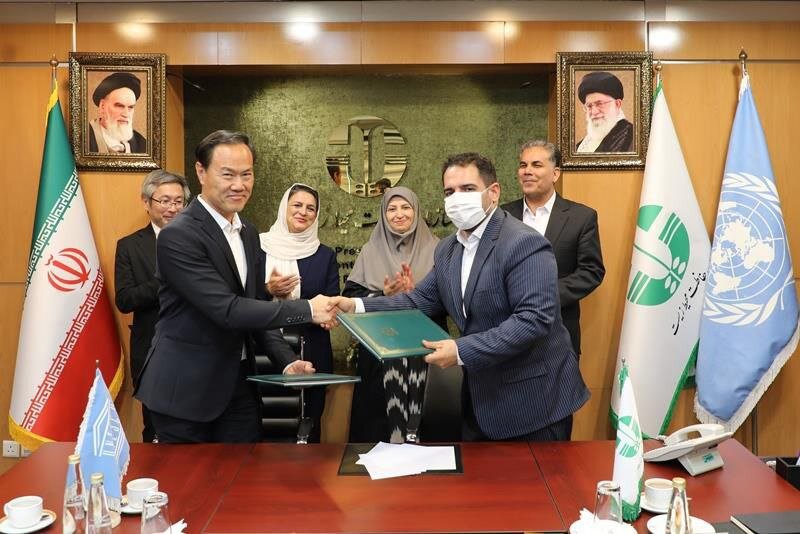Iran, Japan, and UNESCO Unite to Combat Natural Hazards and Enhance Climate Change Resilience
TEHRAN – A significant international initiative aimed at managing natural disasters and enhancing resilience to climate change impacts has been officially launched. This project, supported by Japan, was inaugurated by representatives from the Department of Environment (DOE), the Embassy of Japan, and the United Nations Educational, Scientific and Cultural Organization (UNESCO).
The formal signing of the project’s document took place on Monday, with Ieng Srong, the head of the UNESCO Tehran Office, and Arman Khorsand, the head of the international affairs and conventions office of the DOE, putting pen to paper.
The primary goals of this vital initiative are to:
- Develop flood hazard maps
- Establish early warning systems
- Assess and manage agricultural drought risk
- Empower local communities, particularly women and youth, to effectively prepare for disasters and crises
According to the DOE website, the project aspires to enhance scientific and technical infrastructure in crisis management, positioning itself as a potential regional model for addressing the adverse effects of climate change.
Shina Ansari, head of the DOE, emphasized the challenges posed by climate change and the importance of public participation, indigenous knowledge, and modern technologies in disaster risk reduction. “We are at a critical juncture where collective action is necessary to mitigate the impacts of climate change,” she stated.
In further remarks, Ieng Srong of the UNESCO Tehran Office praised the collaboration between the two organizations, stressing the need to prioritize scientific approaches and awareness-raising in combating climate change.
Understanding Climate Change Impacts
Climate change has significantly disrupted agricultural practices and food security in various countries, with Iran being particularly affected. According to Mohammad-Hossein Emadi, the country’s former permanent representative to the Food and Agricultural Organization (FAO), the impacts are profound.
Key points regarding climate change’s effects on agriculture include:
- Altered rainfall patterns
- Disrupted pollination and flowering cycles
- Changes in harvest timing
Emadi noted that in certain regions of Iran, air temperatures have risen by 2 degrees, while globally, the highest temperature increase is recorded at 1.5 degrees. He highlighted that studies indicate a 23 percent increase in evaporation for every degree of temperature rise, which adversely affects both agriculture and animal husbandry.
Moreover, climate change is not only influencing crop growth patterns but also jeopardizing the nutritional value of various crops. The unexpected consequences of climate change, such as droughts, floods, and landslides, have further compromised food security in the region.
Enhancing Crisis Management through Cooperation
In September 2024, the former head of the crisis management organization, Mohammad-Hassan Nami, advocated for reinforced cooperation among member states of the Economic Cooperation Organization (ECO) in the areas of prediction, prevention, preparation, response, reconstruction, and rehabilitation. He asserted that such collaboration could significantly enhance crisis management efficiency.
Nami pointed out, “The world currently faces formidable challenges, including climate change, water scarcity—especially concerning fresh and safe water—lack of green spaces, and desertification.”
He stressed the importance of leveraging advanced technologies in crisis management, proposing the integration of intelligent systems for effective data analysis. “Access to authentic and reliable information about risks is crucial for making swift, accurate, and effective decisions during emergencies, thereby minimizing financial and human losses,” he added.
However, Nami cautioned that many risks transcend geographical borders, underscoring the necessity for ministries and emergency organizations within ECO member countries to develop coherent information systems. These systems would facilitate timely data analysis, evaluation, and warnings to responsible organizations.
Conclusion
This international project marks a pivotal step in addressing the pressing challenges posed by climate change and natural disasters. By fostering collaboration and utilizing advanced technologies, the initiative aims to create a safer, more resilient future for communities vulnerable to environmental crises.
As the world unites to combat climate change, it is crucial for all stakeholders to engage in meaningful discourse, share best practices, and prioritize sustainable solutions. Only through collective efforts can we hope to mitigate the adverse effects of climate change and ensure food security for future generations.






